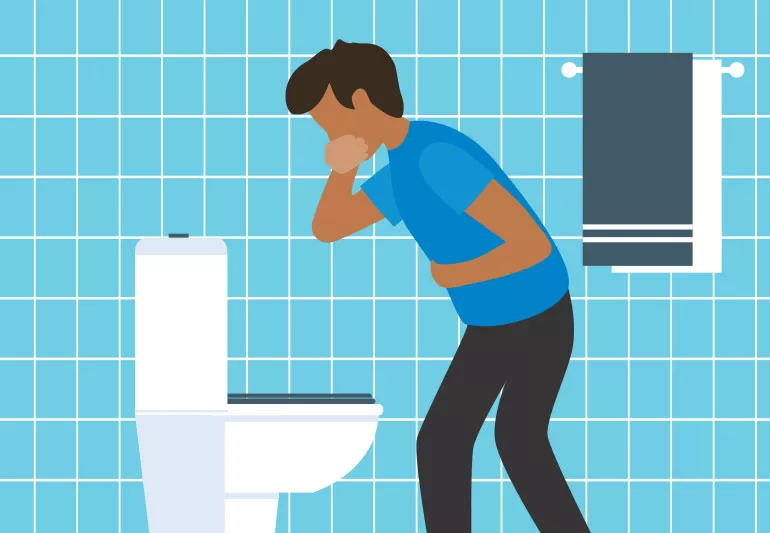How the Terrain Paradigm Explains Digestive Reactions
In the modern world, we have been conditioned to fear microbes in food. The dominant belief is that bacteria, parasites, or other “pathogens” in raw or fermented foods are dangerous invaders that cause disease. But what if this view is completely backward?
What if what we call “food poisoning” is actually the body’s intelligent response to toxicity? What if microbes aren’t the cause of illness but instead bioremediate toxins and signal the body to reject unnatural substances?
Understanding the difference between natural and unnatural environments—both internally and externally—reveals why food-related illness is often misattributed to microbes rather than toxicity.
If you want to support what were doing here at Beyond Terrain, consider joining our Private Community, where we dive much deeper into the specifics of the Terrain Paradigm. Learn more here.
The Modern Misunderstanding: Germ Theory and Food Poisoning
Foodborne illness is framed as microbes attacking the body. The story goes:
- You eat contaminated food.
- Microbes multiply in your gut.
- These microbes “infect” you and make you sick.
But this overly simplistic narrative ignores the body’s internal terrain, the role of microbes in food breakdown, and the true causes of toxicity reactions.
Instead of microbes being the enemy, they are part of a natural process of bioremediation—breaking down dead or toxic material and restoring balance.
Let’s break this down further.
Unnatural Internal Environments: When the Body Can’t Handle Raw Foods
Many people today experience digestive distress when eating raw, unprocessed foods, including fermented vegetables, raw milk, or even spring water. They assume these foods must be dangerous.
But why?
The real reason is that their internal terrain has adapted to an unnatural diet—one devoid of natural microbes.
- Processed foods, antibiotic use, and chemical exposure create a sterile, inflamed digestive environment.
- When raw foods containing beneficial microbes are introduced, the body may detox rapidly, leading to symptoms like bloating, diarrhea, or nausea.
- This is often mistaken for “foodborne illness,” when in reality, it is a healing crisis—a sign that the body is eliminating stored toxins.
Just like a person withdrawing from drugs experiences symptoms, a body detoxing from sterile, artificial foods may initially react to natural, probiotic-rich foods.
Imagine you’ve lived in an air-conditioned home your whole life and suddenly step outside into the sun. You get dizzy and uncomfortable. But does that mean the sun is dangerous? No. It means your body isn’t adapted.
Over time, as the terrain recalibrates to a natural state, these reactions subside.

Unnatural External Environments: When “Food Poisoning” is Actually Toxicity
Now, let’s address the other side of the equation.
People assume that microbes in food cause foodborne illness, but this ignores the fact that modern industrial food is often inherently toxic—even before microbes touch it.
The Silent Danger of Sterile Processed Foods
- When food is heavily processed, chemically altered, or irradiated, it enters the body in a form that the digestive system does not immediately recognize as harmful.
- These foods are often sterile, meaning there are no microbes present to signal the body to reject them.
- Because of this, toxins can accumulate silently without immediate symptoms. Over time, this leads to chronic disease rather than acute reactions.
Example: Fast food can be left out for weeks without molding or decomposing. This is because it lacks natural microbial activity. If microbes won’t eat it, should we?

Why Spoiled Food Causes Immediate Symptoms
When bacteria or fungi do colonize unnatural, processed foods, they begin breaking down the toxins in these foods.
- This triggers the body’s natural detox response—vomiting, diarrhea, nausea.
- The microbes themselves are not the cause of illness—they are simply alerting the body that the food should be rejected.
- This is why a half-cooked, antibiotic-laden, factory-farmed chicken breast is far more likely to cause “food poisoning” than a fresh, high-quality raw steak.
Imagine drinking a cup of pure gasoline. You would vomit immediately. But if the gasoline was diluted and flavored to taste like soda, you might consume it without immediate symptoms—yet suffer long-term damage.
This is exactly how modern processed foods harm the body silently, while microbes act as a natural early warning system.

The Difference Between Raw and Processed Food Reactions
Not all food reactions are the same. Consider these two scenarios:
1️⃣ Drinking Raw Milk for the First Time
- Some people may experience bloating or mild digestive discomfort.
- This is not food poisoning—it’s an adjustment process as the gut flora recalibrates.
- After adaptation, raw milk is digested effortlessly.
2️⃣ Eating Half-Cooked Factory Chicken
- Vomiting, nausea, and diarrhea occur quickly.
- The body immediately rejects the food due to bacterial signals indicating high toxicity.
- This is true food poisoning—not caused by bacteria but by the toxicity of the food itself.
Key Takeaway:
- If real food causes symptoms, your internal terrain needs adaptation.
- If toxic food causes symptoms, your body is rejecting poison.
The difference lies in the source and quality of the food—not the presence of microbes.
Can We Adapt to Toxic Foods? Yes, But at a Cost
Over time, the body can build a tolerance to unnatural food—but this is not a good thing.
- Instead of detoxing, the body suppresses symptoms, leading to chronic disease.
- This is why some people can eat junk food without immediate issues, but over time, develop diabetes, heart disease, and cancer.
- Their body is no longer warning them—it has adapted to dysfunction.
Conversely, we can also adapt to natural foods and develop a strong internal terrain.
- Those who regularly consume raw, unprocessed, microbially rich foods thrive in natural environments.
- They can drink from fresh mountain streams, eat raw animal foods, and experience no illness.
The Natural Order
- Toxic food should make you sick (so your body rejects it).
- Natural food should be digested effortlessly.
- If the opposite is true, your terrain needs recalibration.

Final Thoughts: Food Poisoning is a Misinterpretation
- Microbes do not cause foodborne illness—they reveal toxicity.
- The body reacts to unnatural foods because they are harmful, not because they contain bacteria.
- A strong, adapted terrain can handle raw, living foods without issue.
By removing toxins, rebuilding the gut, and embracing natural food, we can restore the body’s ability to respond intelligently—without unnecessary suffering.
Terrain is everything. Heal the terrain, and the rest follows. If you’re interested in exploring your personal experience with food poisoning, join our private community where we can discuss this more specifically!

